
[ IMDB | Streaming (ShoutFactoryTV) | Streaming (Tubi) | Streaming (YouTube I, YouTube II) | Wikipedia ]
Also known as The Triumph of Hercules and Hercules and the Ten Avengers.
1:34:00 running time, 2.35 : 1 aspect ratio
ShoutFactoryTV and Tubi had the same print (1:30:53). It was cropped which created noticable deficiencies in some scenes because of it, but I went with it because it was closest to being the full running time. YouTube I (1:14:21) was uncropped and equally good quality, but 16 minutes shorter. YouTube II was verrrry poor quality and dubbed in French (?!). After watching, I have some regrets about not going with the shorter, uncropped version especially since several of the scene kind of dragged.
- Alberto De Martino – Director. Also directed the MST3K classic The Pumaman (1980) and the giallo film The Man with Icy Eyes (1971).
- Francesco De Masi – Soundtrack. Also did Hercules the Invincible (1964)
- Dan Vadis – Hercules. Also in Hercules the Invincible (1964).
- Marilu Tolo – Princess Ate. Also in Messalina vs. the Son of Hercules and Maciste, Gladiatore of Sparta (1964).
- Pierre Cressoy – Prince Milo.
- Piero Lulli – Euristeo, brother of Erione. Also in The Beast of Babylon Against the Son of Hercules (1963) and a very small role in Hercules and the Tyrants of Babylon (1964).
- Jacques Stany – Erione, brother of Euristeo. Also in Maciste, Gladiatore of Sparta (1964).
- Moira Orfei – Pasiphae, the witch. Also in Mole Men Against the Son of Hercules (1961) and Beast of Babylon Against the Son of Hercules (1963). Again, the wonderful Female Villians Wiki provides an entry for her.
Notes:
- This started with a classic orchestral movie overture, laying out all of the themes in brief before the movie proper starts. More polished than the soundtracks from the other films.
- Like Triumph of the Son of Hercules (1964), high-quality prints available streaming. I took many screencaps just because the Eastmancolor Chromoscope looked so good. Would love to see an original print.
- De Martino’s Pumaman is a visual and narrative dumpster fire. It’s hard to believe that the same man directed both films.
Story:
Mycenae. (Trivia: the archaeological site has the tomb of Agamemnon.)
We open with battle between soldiers led by prince Milo (the king’s nephew) and villagers which, oddly, the soldiers are losing. King Panteone (not credited?) approaches and banishes Milo because of his cruel treatment. Mil,o then has one of his soldiers, Gordio, assassinate the king via spear as the king rides away. Dying words: “send for Hercules!” Of the villagers, two brothers escape and split up. Erione goes to find Hercules, Euristeo to tell the people of Milo’s treachery.
Milo goes to a cave where his sorceress mother Pasiphae appears in a puff of red smoke. She tells him that he must take the throne in order for Princess Ate (AH-tee) to marry him since she cannot ascend to the throne without a king. She than gives him enchanted dagger. Power unknown. He leaves and she looks into a pool and sees Erione landing on a shore, with Hercules greeting him. Scheming, she turns the ground to quicksand but Hercules swings overhead on a rope and pulls him from the morass. “That is odd. There’s never been quicksand here before!” (Trivia: We see Hercules wearing a belt buckle with a lion’s head on it. In mythology he is usually shown wearing the pelt of the Nemean lion, it’s head draped over his.)
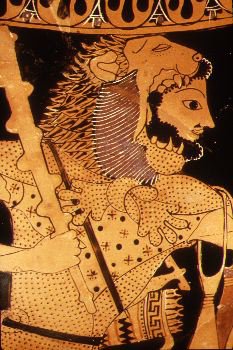
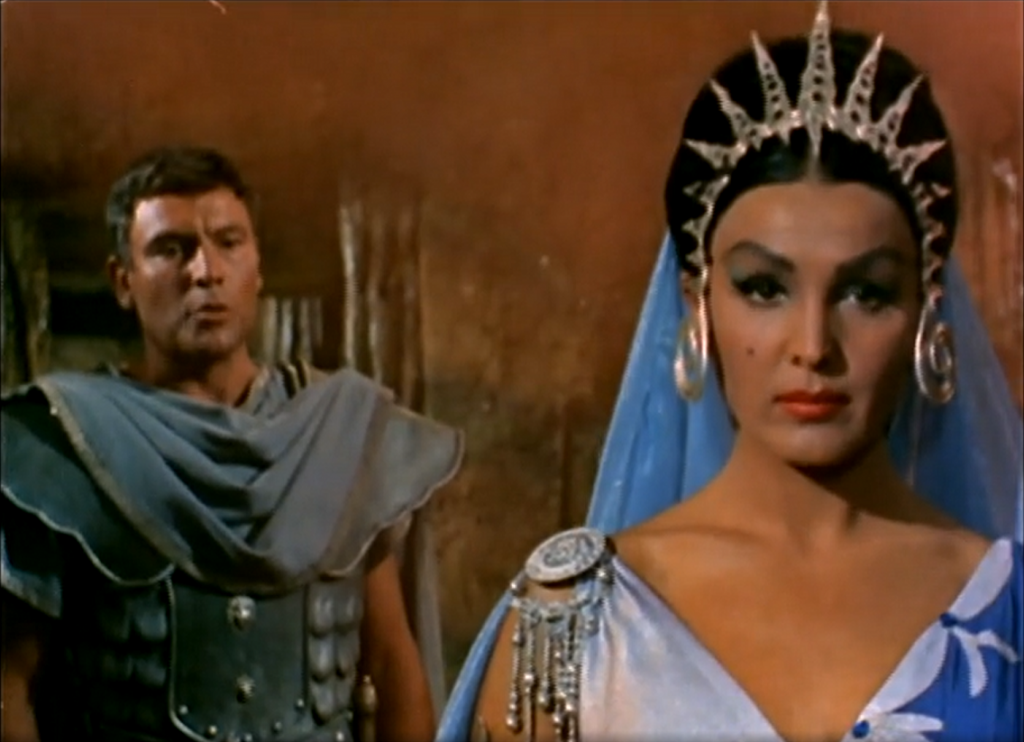
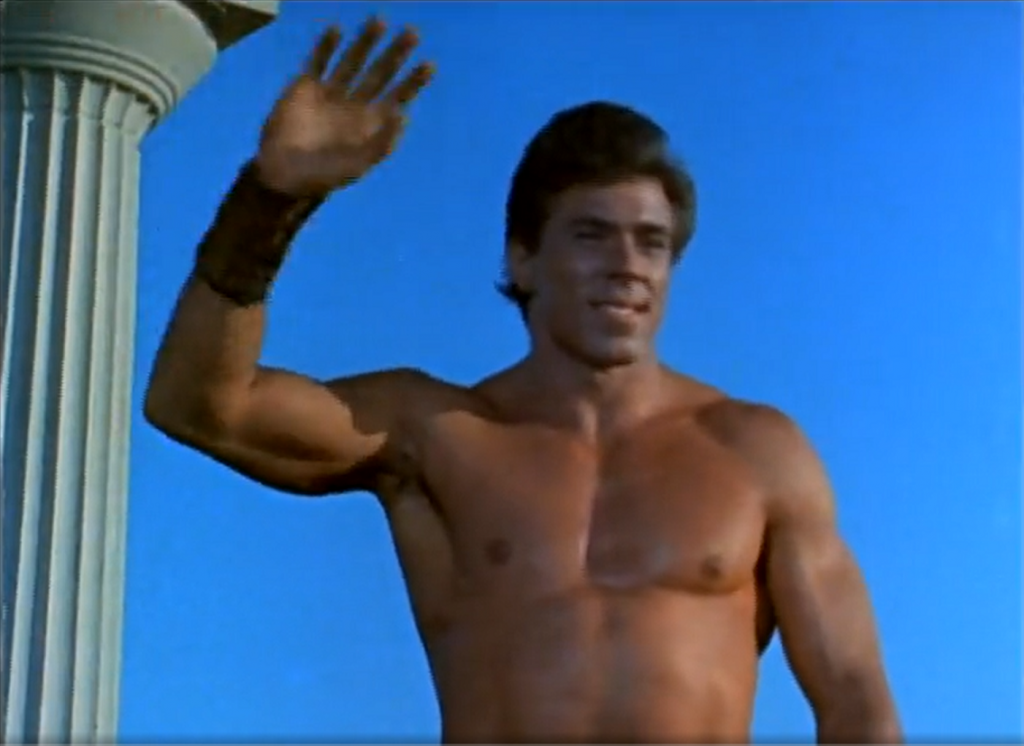
Milo enters city, triumphant, but is immediately accused by Euristeo of assassinating king, resulting in a battle between the soldiers and citizens. For a second time the soldiers are losing to the lesser-armed populace. It’s an odd narrative choice. Milo, by pulling the dagger out of its sheath, makes 7 giant warriors appear who then beat the rioters into submission. (Why is an alternate title Hercules and the Ten Avengers?) The knife is sheathed, and the warriors disappear. Milo goes to Ate and contradicts Euristeo, telling her that another had killed the king and is trying to frame him.
Back with Erione and Hercules, Euristeo arrives and tells them of Milo’s seven gold warriors. Hercules looking thoughtful (in a comical, Dan Vadis way) says they are sometimes call the Hundred Hands. They are invulnerable and are the seven sons of Jaya, Juno’s sister who is angry at Hercules.
Trivia: Juno is the Roman Hera, so I’m not sure why this is happening in Mycenae. I may have misheard the location at the beginning of the film. Also, I can’t find any reference to Jaya so maybe misheard that also. The Hundred Hands are three monsters from, more confusingly, Greek mythology collectively named the Hecatoncheires. They are Cottus, Briareus (or Aegaeon), and Gyges, who each have fifty heads and one hundred arms.
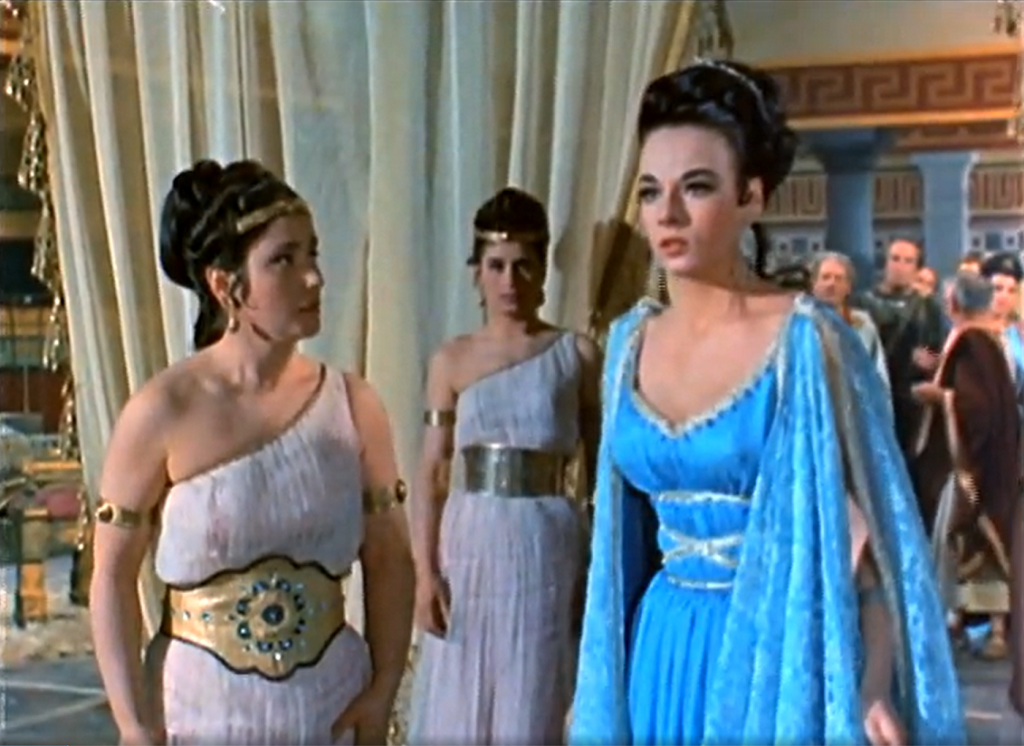
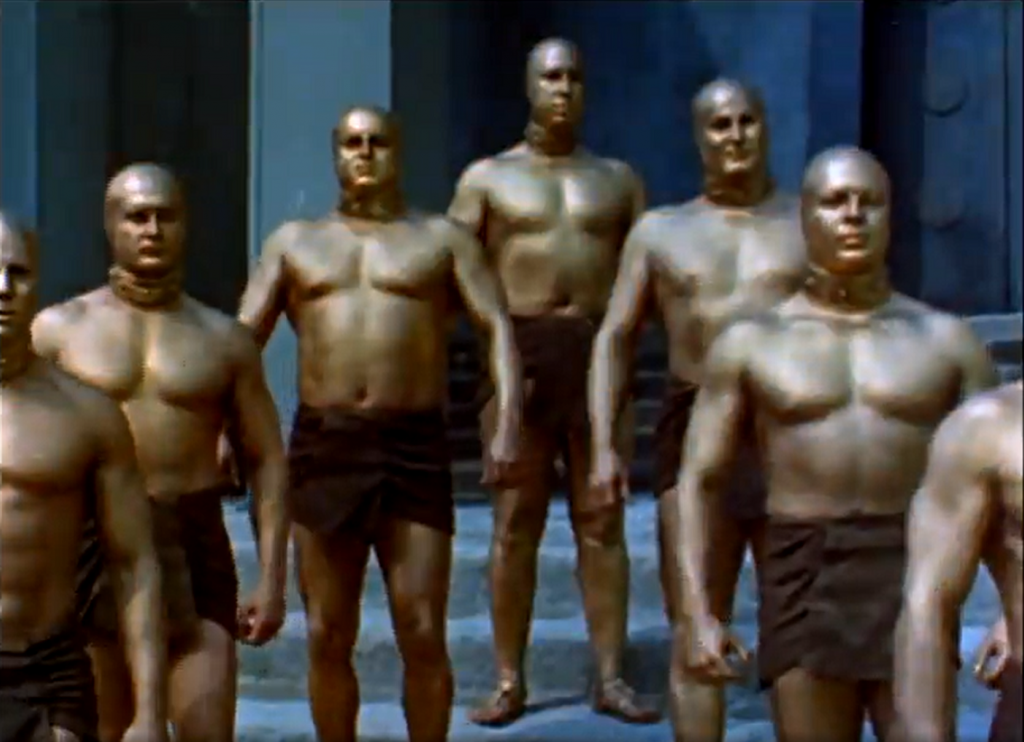
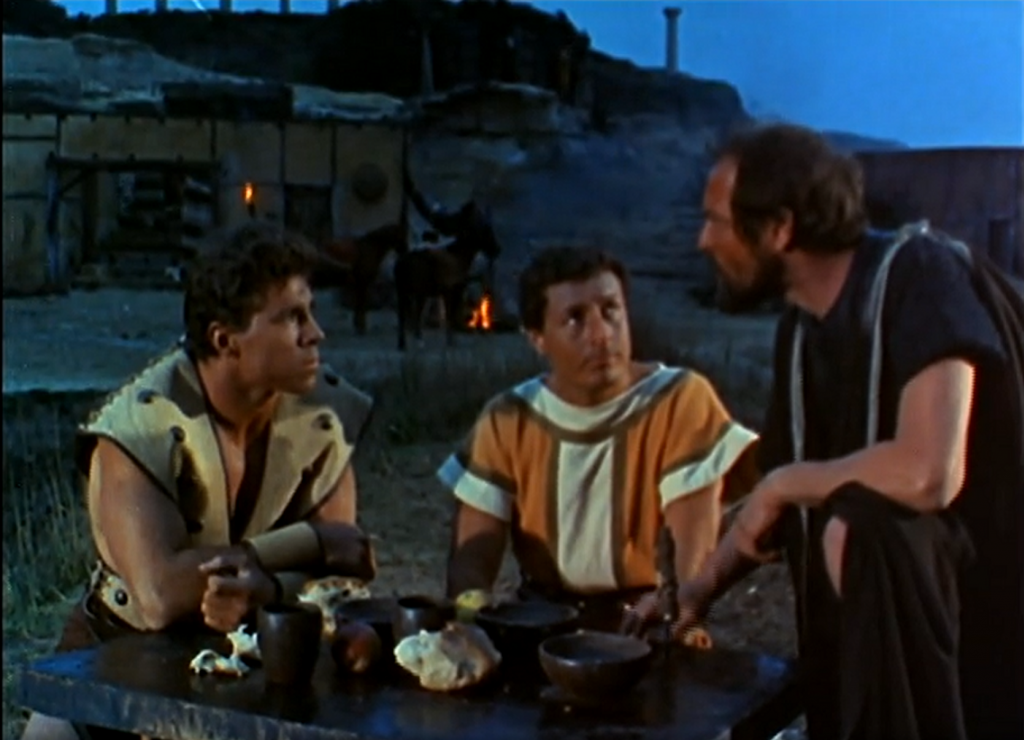
Abadur, an Assyrian prince, arrives to fight Gordio. Milo promises Ate to Gordio as a bride if he win, but secretly is scheming to have him and Ate killed after the fight. A ceiling of blades awaits to fall on their chariot when they pass through if triumphant. Meanwhile in the crowd, two thieves chat up a wealthy man and surreptitiously swipe his purse. We will see them later. Also in attendance is Erione and Hercules, who Ate eyes with interest. When the gladiatorial fun begins, Gordio arrives on chariot and challenges Abadur on horseback. Unfair, but Milo allows it. After a possibly too long battle scene where Abador is knocked off his horse but then leaps on the chariot to fight hand-to-hand, Gordio eventually knocks him off runs him over with the chariot’s bladed wheels. Grisly. Aghast at the injustice, Hercules, weaponless, challenges Milo. More excessive battle scenes and Hercules eventually knocks him off his chariot and while fighting hand-to-hand, Milo is pushed back onto the wheel blades and parishes. Also grisly. In triumph, Hercules and Ate take a victory lap and end below the bladed trap set for Gordio. Hercules stops the descending platform and tosses it aside. The crowd cheers and Milo is once again thwarted.
While these gladiatorial and princess-cide events are occurring, the two thieves sneak from prior crowd-centered pilfering sneak into the royal palace and grab random items of value. One spies the dagger but is outwitted by a monkey who grabs it and scurries up a column. They leave and the monkey, curious as one is, unsheathes the blade causing the warriors to appear and run amok. Hercules engages in one of his more comic battles as he fights them, knocking heads and jumping out of their way like a bullfighter, all the while laughing. The dagger is eventually re-sheathed and Milo uses the rampage to prove that he is innocent of the king’s murder and he is now a target of the same scoundrel.
On a walk through the royal gardens, Ate tells Hercules that Euristeo was banished by the king because he wouldn’t let Euristeo marry her. She learned this from Milo. Very suspicious.
Erione is imprisoned and killed on Milo’s command because he’s a friend of Hercules and then Milo has men kidnap Ate. He show Erione’s body to Hercules and paints him as the leader of the rebels who kidnapped the princess. Through his interactions with Milo, Hercules has been unusually credulous and here is no different. He storms off to the village, tears it to pieces, and when Euristeo pleads ignorance of Ate’s whereabouts, Hercules kills him. Having used his power unjustly, Jove takes away his strength and Hercules realizes the depth of his mistake.
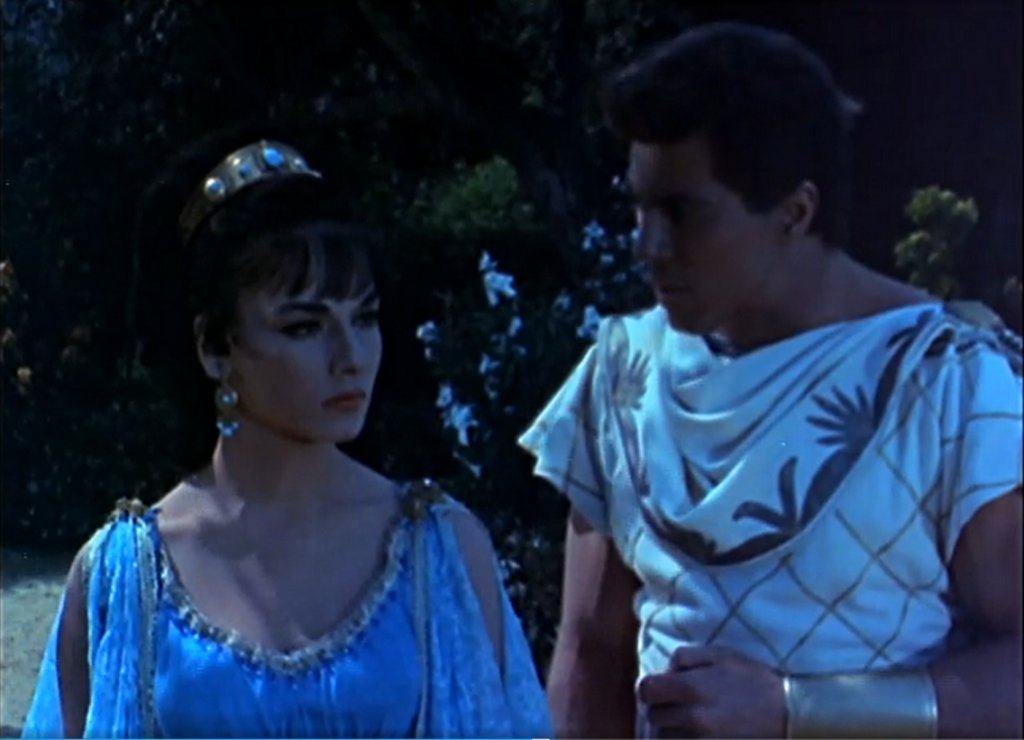
Now that Hercules has no strength, Milo imprisons Ate. He says that although she would give him the throne, the people love her too much and would not accept that she did it willingly. Hercules confronts Milo but is eventually beaten senseless and captured by his guards.
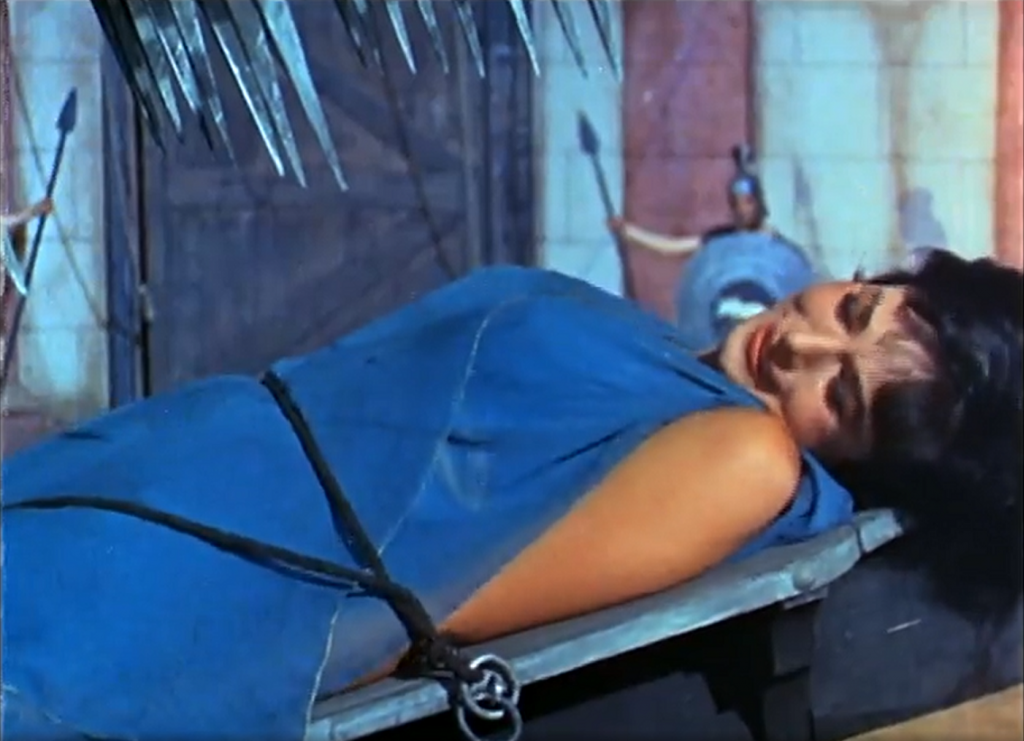
In a plan to take care of both Hercules and Ate, Milo binds her underneath a spiked platform that can only be stopped if Hercules hold up the stones weighing it down. Additional weights are gradually added to prolong his torture. (This is reminiscent of Majestus in Mole Men Against the Son of Hercules (1961) having to hold bladed weights up in order to save his friends.) During all of this, the two thieves gather the citizens to storm the palace and save the queen. Hercules, at the last moment, asks Jove to sacrifice him and save Ate and that act of selflessness returns his strength. He then saves Ate and destroys the dagger in fire.
Milo grabs Ate and escapes with her to Persiphae’s cave, where she retrieves the dagger from the magic pool (that she had previously used to spy on Hercules). Milo perishes after Hercules chases him through the labyrinthine tunnels and he plunges into a fire pit. In another tunnel, Persiphae captures Ate and takes her out to a cliff overlooking the ocean and pushes her over it. She grabs an outcropping and calls for help. When Hercules arrives to save her, Persiphae disguises herself as Ate, hangs off of the cliff, and says that she’s the real Ate. Hercules realizes the ruse and she falls to her death as Ate is saved.
As Hercules enters the city with Ate, triumphant, we see the thieves stealing from the same man as before. Scamps.
| Source for streaming | Description |
|---|---|
| Amazon Prime Video | |
| Dailymotion | |
| Internet Archive | |
| Old Time Movies and Radio | “Free streaming classics and also rubbish” |
| PEPLUM TV | |
| ShoutFactoryTV | |
| Speedflix | “We’re building a video content portal intended to provide a simple, efficient approach to finding video content that matches your interests. We hope you’ll browse our large library of videos to find content you love.” |
| Tubi | |
| Vimeo | |
| YouTube |